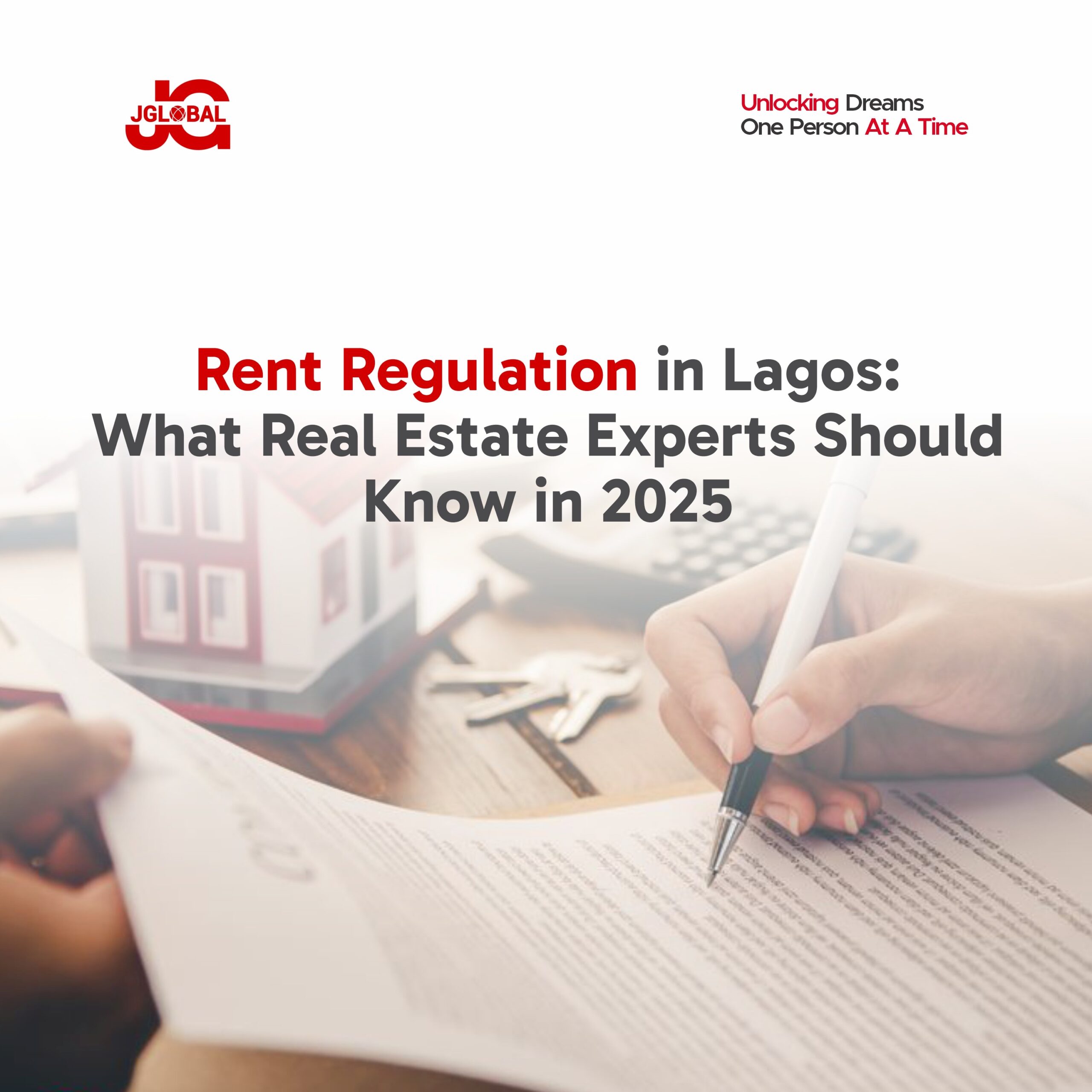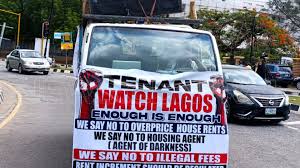Rent Regulation in Lagos: What Real Estate Experts Should Know in 2025

Introduction: Why Rent Regulation in Lagos Matters Now
Lagos, Nigeria is facing an escalating housing affordability crisis. Rents have surged dramatically, with some areas experiencing increases of up to 100% over the past year. For instance, in neighborhoods like Agege, Surulere, Somolu, and Bariga, a room and parlour self-contained apartment now commands annual rents between ₦1 million and ₦1.7 million. Additional costs, including agency fees, legal charges, and caution deposits, can add another ₦700,000 to ₦900,000 to the total, making housing increasingly inaccessible for many residents.
This situation has intensified calls for rent regulation in Lagos. The recent legislative initiative in Enugu State has further spotlighted the issue.
In Lagos, the state government has acknowledged the urgency of the matter. Jubril Gawat, Senior Special Assistant on New Media to Governor Babajide Sanwo-Olu, indicated on social media that discussions on rent regulation are forthcoming, emphasizing the need for thorough deliberation by the Lagos House of Assembly.
This article will discuss the implications of rent regulation in Lagos and how it extends beyond political discourse.
What Sparked the Rent Regulation Debate in Lagos?
In March 2025, the Enugu State House of Assembly introduced a bill aimed at regulating tenancy practices. This proposed legislation sought to cap agency and legal fees at 10% of the annual rent and abolish the longstanding practice of collecting non-refundable caution fees from tenants. The bill also aimed to establish clear guidelines for eviction processes and ensure that only certified agents operate within the state.
This move by Enugu State garnered significant attention nationwide, highlighting the challenges tenants face regarding exorbitant fees and unregulated practices in the rental market.
Violations could result in fines up to ₦500,000 or six months’ imprisonment.
In response to the growing public concern, the Lagos State Government acknowledged similar issues within its jurisdiction. Special Adviser to Governor Babajide Sanwo-Olu on Housing, Barakat Odunuga-Bakare, emphasized that the state’s tenancy law caps tenancy agreement fees at 10% of the annual rent.

She urged residents to report any violations, noting that many of these illegal activities are perpetrated by unregistered individuals operating outside the purview of established professional bodies.
Furthermore, the Lagos State Government announced plans to introduce monthly and quarterly rent payment options to alleviate the financial burden on residents, especially low-income earners. This initiative aims to make housing more accessible and affordable, reflecting the government’s commitment to addressing housing challenges in the state.
The public’s frustration with rising housing costs and unregulated agents has intensified the call for rent regulation in Lagos. The state’s proactive measures indicate a recognition of these challenges and a commitment to implementing solutions that protect tenants and ensure a fair rental market.

How Rent Regulation in Lagos Could Impact Tenants and Landlords
Rent regulation is a hot topic in Lagos, and for good reason. Let’s explore how these changes could affect both tenants and landlords.
What Rent Caps Mean for Tenants
For many Lagosians, paying a year’s rent upfront is a significant financial burden. Recognizing this, the state government has introduced policies to ease this pressure.
- Flexible Payment Options
Tenants can now pay rent monthly, quarterly, or yearly, with landlords prohibited from demanding more than one year’s rent in advance.
- Capped Agency Fees
Agency fees are now capped at 10% of the annual rent, and illegal charges like caution fees and inspection fees have been declared unlawful.
These measures aim to make housing more accessible and reduce the financial strain on tenants.
New Expectations for Landlords and Agents
Landlords and real estate agents are also affected by these regulations, which promote transparency and fairness in the rental market.
- Compliance with Fee Caps
Landlords and agents must adhere to the 10% cap on agency fees and avoid imposing illegal charges.
- Flexible Rent Collection
Landlords are encouraged to accept monthly or quarterly rent payments, aligning with the new policies aimed at easing tenants’ financial burdens.
These changes require landlords and agents to adjust their practices, fostering a more equitable rental environment.
Ensuring Fairness and Addressing Loopholes
While these regulations are a step in the right direction, effective enforcement is important to their success.
- Reporting Mechanisms
Tenants are encouraged to report landlords or agents who violate these regulations through official channels provided by the Lagos State Real Estate Regulatory Authority (LASRERA).
- Legal Recourse
Section 37 of the Lagos State Tenancy Law prohibits unreasonable rent increases and offers tenants legal avenues to challenge such actions in court.
By actively involving all stakeholders and ensuring compliance, these regulations can lead to a more balanced and fair rental market in Lagos.
What Real Estate Investors and Agents Must Know About Rent Regulation in Lagos
Rent regulation in Lagos is going to shape the real estate landscape. For investors and agents, understanding these changes is crucial to navigate the market effectively and maintain profitability.
Impact on Rental ROI
This regulation aims to make housing more affordable for tenants but also affects the income streams of landlords and agents. With these caps, the traditional upfront earnings from new leases are reduced, potentially impacting the return on investment (ROI) for property owners.
However, the high demand for housing in Lagos, driven by a population projected to exceed 20 million at the end of 2025, continues to push rental prices upward. For instance, rental apartments have seen a 47.25% increase, and rental houses have risen by 44.85% in recent years. This surge indicates that, despite regulatory caps, the overall rental income potential remains strong.
Demand for Certain Properties
The shift towards rent regulation will influence tenant preferences. Properties that offer flexible payment options, such as monthly or quarterly rents, will become more attractive. Additionally, short-let apartments are gaining popularity, especially in areas like Lekki, Ikoyi, Victoria Island, Ikeja GRA, and Yaba. These properties cater to corporate guests, digital professionals, and event visitors who prefer the flexibility and amenities of short-term rentals.
Investors focusing on such properties can capitalize on the growing demand, ensuring steady occupancy rates and potentially higher returns.
Agent Commissions and Practices
With the enforcement of the 10% cap on agency fees, real estate agents must adapt their business models. The Lagos State Government has emphasized the need for transparency and adherence to these regulations, warning against illegal charges.
Agents are encouraged to:
- Ensure Transparent Pricing
Clearly communicate all fees and charges to clients, ensuring compliance with state regulations.
- Stay Informed
Keep abreast of any changes in housing laws and regulations to provide accurate information to clients.
- Build Trust
By operating within the legal framework, agents can build trust with clients, leading to repeat business and referrals.
Proactive Tips for Investors and Agents
- Vetting Properties
Before investing, ensure the property has clear and verifiable documentation, such as a Certificate of Occupancy or Governor’s Consent. This reduces the risk of legal disputes and enhances the property’s resale value.
- Transparent Pricing
Adopt a pricing strategy that aligns with market trends and regulatory requirements. This approach not only ensures compliance but also attracts tenants seeking fair and predictable rental terms.
- Adapting to Regulations
Stay updated on the latest housing policies and adjust your investment strategies accordingly. This proactive approach can help mitigate risks associated with sudden regulatory changes.
By understanding and adapting to rent regulation in Lagos, real estate investors and agents can navigate the evolving market landscape, ensuring sustained profitability and compliance.
Conclusion: Is Rent Regulation in Lagos the Solution or Just a Temporary Fix?
Rent regulation in Lagos has become a hot topic, especially as more tenants struggle with rising housing costs. With the government introducing new rent control measures, many are wondering is this a real solution to the housing crisis or just a temporary relief?
Like most big policy decisions, there are pros and cons, and it’s important to look at both sides before jumping to conclusions.
On the positive side, rent regulation in Lagos helps protect tenants. New policies now allow tenants to pay rent monthly, quarterly, or annually instead of being forced to pay one or two years upfront. The Lagos State Government has also capped agency fees at 10% and removed extra charges like caution fees. These changes offer much-needed relief to renters who have long dealt with unfair and inconsistent practices from landlords and agents. The aim is to make housing more affordable, and encourage transparency in the rental process.
But rent regulation in Lagos doesn’t come without challenges. For many landlords, capping rent and agency fees reduces their expected return on investment (ROI). Some may hesitate to invest in property development or even in regular maintenance.
Over time, this could lead to housing shortages if property owners decide it’s no longer worth the effort. Another concern is that regulated rent might distort the market, making it harder for supply to meet demand.
When rent is kept artificially low, more people want to rent, but fewer landlords are willing to offer properties which can lead to overcrowding or a lack of options. There’s also the risk of a drop in housing quality, especially if landlords don’t have the funds or motivation to maintain their properties properly.
Looking ahead, the next 6 to 12 months will be crucial in determining the success of rent regulation in Lagos. The government may need to fine-tune its policies to strike the right balance between tenant protection and landlord incentives. We’re also likely to see more enforcement making sure landlords and agents follow the rules. On the market side, landlords and agents might begin exploring new rental models, such as short-term or serviced rentals, to adapt to the changing environment.
In the end, rent regulation in Lagos is not just a policy issue, it’s a housing and economic issue that affects everyone. Whether you’re a tenant, landlord, investor, or agent, it’s important to stay informed, follow the developments, and take part in the conversation.
If you’ve experienced challenges with rent, or have insights about what’s happening in your area, don’t stay silent. Share your thoughts, ask questions, and let’s keep the discussion going.
After all, the future of Lagos’ real estate market depends on how well we all respond to these changes.



